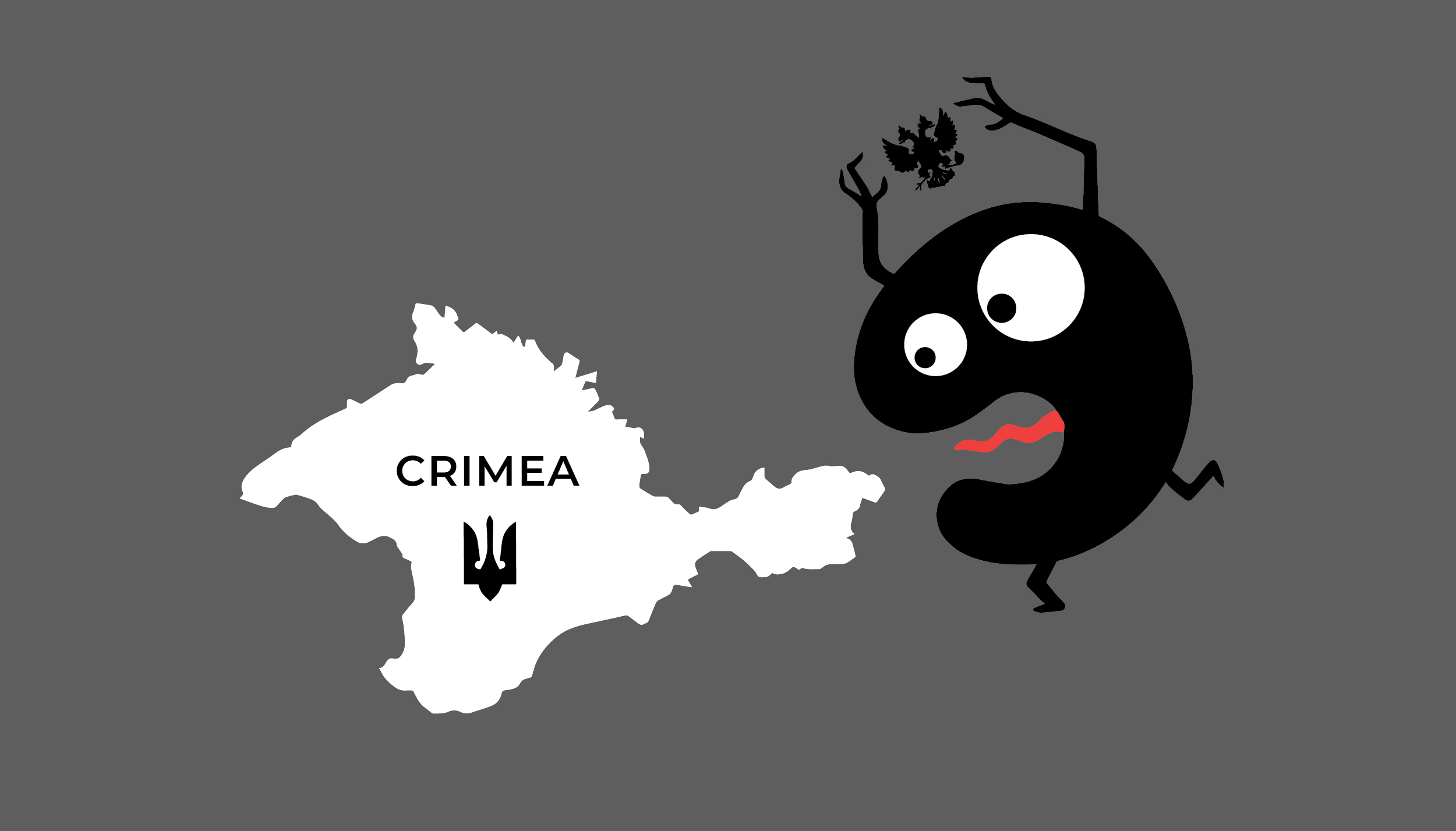

Українською читайте тут.
The annexation of Crimea by Russia commenced on February 20, 2014. During that winter's end, Russian forces initiated an operation to seize the peninsula. This involved deploying troops, asserting control over local authorities, blocking Ukrainian military units, exerting informational pressure, and enacting illegitimate legal measures. This initial aggression culminated in an ongoing armed occupation. Subsequently, Russia, in defiance of international law, formally annexed Crimea and has since sought to legitimize its actions. "Detector Media" has consistently covered developments related to Crimea, offering insights into various aspects of the situation. Explore accounts from 2014 by Vladyslav Seleznyov, then head of the Crimean Media Center of the Ministry of Defense, gain retrospective perspectives on media landscape changes during the peninsula's occupation, and learn about Ukraine's efforts towards future de-occupation and the return of Crimea.
The Institute of Mass Information reports that as time has elapsed since the Crimea occupation, there has been a noticeable decline in coverage of Ukrainian news within the peninsula's information space. Instead, Russian media channels have been dedicated to reinforcing the narrative of Crimea's belonging to Russia. Key topics emphasized by occupiers' media include purported improvements in the region's standard of living, the promotion of tourism, and the portrayal of Crimea as an attractive destination for international investment across various economic sectors. Additionally, representatives of the occupation authorities have consistently asserted the notion of "Krymnash" (Crimea is ours), while also briefly discussing the alleged hardships of life under the so-called "Kyiv junta" rule.
Following the commencement of the full-scale invasion, the Crimean populace once again turned their attention to Ukraine, with discussions revolving around the ongoing "war and Crimea" narrative. This included topics such as the mobilization of peninsula residents, efforts to identify "pro-Ukrainian Zhdun" (The One Who Waits), reports of attacks on military installations and Russian Black Sea Fleet facilities in Crimea, concerns over the lack of bomb shelters, and criticism of local authorities' negligence in ensuring civilian security and identifying potential escape routes to the mainland. In the early days of the conflict, Serhiy Aksyonov sought to reassure Crimeans by asserting that Crimea was not under threat, as all military operations were confined to neighboring territories. However, by June 2022, he claimed that Russian air defense forces would prevent any attacks on Crimea by the Armed Forces. Nonetheless, the military actions still impacted the peninsula, including the illegally constructed Kerch Bridge.
Amidst ongoing reports of attacks from various Ukrainian drones, American ATACMS ballistic missiles, Storm Shadow missiles, and alleged "attempts" by Ukrainian-Western "agents" on the lives of local authorities, as well as restrictions on crossing the Crimean border with the Kherson region, the impending tenth anniversary of the annexation of Crimea is causing great concern for the occupation authorities. It is evident that propagandists are strategically disseminating key messages ahead of this milestone event, aiming to shape public perception surrounding the so-called reunification.
Ten-year euphoria and "vertigo from success"
Soviet propaganda was notorious for its tendency to exaggerate the country's achievements across various domains, boasting about abundant milk production, massive coal yields, and the construction of supposedly record-breaking roads and canals. Similarly, contemporary Russian propaganda mirrors this approach by distorting the actual state of affairs to glorify the current political regime. Like its Soviet predecessor, the Russian government exaggerates its accomplishments to instill a sense of euphoria and triumph among the populace. This tactic aims to manipulate public opinion, bolster morale, and consolidate support for the regime. However, by presenting a distorted or excessively positive version of reality, propaganda runs the risk of fostering unrealistic expectations and overlooking underlying problems or challenges.
To foster a sense of euphoria regarding Crimea's annexation by Russia and to downplay the challenges faced by its residents, propagandists initiated the hashtag #СпасибоЗаКрым and encouraged social media users to highlight "positive changes" in their communities. These changes ranged from the installation of new pathways or fountains in local parks to the addition of playgrounds or benches near residential areas. Posts reflecting such "improvements" can be found across various platforms like YouTube, Instagram, Telegram, Vkontakte, and others. By showcasing these enhancements to everyday public spaces in Crimea, propagandists aim to create a false perception that ordinary people are content with the occupation and its purported benefits, thus promoting this sentiment on social media.
"After 2014, a new era of prosperity began in Crimea. On the instructions of the President of Russia, Vladimir Putin, tourist complexes were restored in the near future, production was revived and new opportunities for investment were created. "In just a few years, Crimea turned from a depressed province into a pearl of the Black Sea," propagandists assure.
Dynamics of use of the hashtag #СпасибоЗаКрым from December 1, 2023 to February 21, 2024. 4340 messages from 435 Telegram channels. Data from TeleZip / Mantis Analytics
The publication of posts under this hashtag is positioned as an alleged "people's flash mob." However, the majority of posts from the #СпасибоЗаКрым #ThanksForCrimea series are not published by "ordinary Crimeans", but by state bodies of the Russian occupation administration, from those who report on the improvement of village councils or branches of the ruling United Russia party.
In order to stimulate the imitation of "popular euphoria", financial incentives for pro-Russian Internet bloggers to spread these theses are also used - with the help of grants and contests. For example, the author of the Russian "patriotic" channel with 288,000 subscribers, who specializes in promoting theses about how bad things are abroad and how good things are in Russia, published the video "How Crimea has changed in 10 years." This video won the contest "To Russia with Love" announced by the Russian Presidential Fund for Cultural Initiatives.
The "Crimean Tatar TV channel Millet" created by the occupation authorities also started its series of propaganda programs for the "anniversary". In the description of the project called "Russian Crimea", the construction of roads, landscaping, provision of street lighting and medical care for the inhabitants of the peninsula are listed as "achievements" of the occupying power. "We will tell you about the achievements of the Russian Crimea," says the statement of the TV channel about the fulfillment of these "extraordinary" administrative tasks.
Putin's official celebrations and "elections"
In addition to simulated "people's flash mobs", the Russian authorities are also holding official events to celebrate the tenth anniversary of the occupation. Various representatives of the occupation and Russian authorities take part in them. In particular, the self-styled "State Council of the Republic of Crimea" under the leadership of Volodymyr Konstantinov created a medal "To commemorate the 10th anniversary of the reunification of Crimea with Russia 2014-2024". "It will encourage citizens [...] for courage, heroism, active political activity and personal contribution to the reunification of Crimea with Russia; for participation in the preparation and holding of the all-Crimean referendum on March 16, 2014," Konstantinov said.
The Russian Ministry of Foreign Affairs recently organized a presentation on February 15 to unveil the collection "Crimea in the Development of Russia: History, Politics, Diplomacy. Documents of the archives of the Ministry of Foreign Affairs of Russia." This collection, introduced by Russian Minister Sergey Lavrov alongside Crimean occupiers, aims to assert the "inextricable connection between the fate of Crimea" and Russia.
Surprisingly, the government of the Kamchatka region also joined in the celebration of the "jubilee" of the occupation. They launched the website "10letvmeste.rf," congratulating Kamchatka residents on the "anniversary" and urging them to register on the Russian electronic voting portal for a chance to participate in a quiz with prizes in honor of the "holiday" (which include household appliances, a trip to Crimea, and even a car). The portal requires registration and voting on specified dates, coinciding with the dates of the fake Crimean "referendum" of 2014 and the upcoming presidential elections in Russia. Interestingly, the purpose of the voting is not specified on the site. Meanwhile, no such quizzes are planned within Crimea itself, as reported by the Russian publication Kommersant.
Propaganda actively exploits the coincidence of Putin's upcoming "election" with the tenth anniversary of the occupation. The "elections" are advertised alongside the "anniversary," attempting to bolster the legitimacy of the occupation by showcasing the supposed "unity" of Crimean residents during voting. Konstantinov, mentioned above, boasts of the "democratic nature" of the Crimean elections, asserting that all political events, including elections, referenda, and voting, affirm the unwavering unity of Crimeans.
February 20 as a day of "demarcation"
In 2014, the Ministry of Defense of Russia inscribed February 20, 2014, as the start date of the operation on the medal for the "return of Crimea." However, in 2018, Russian Foreign Minister Lavrov dismissed this date as a "technical misunderstanding." Recently, propagandists have seemingly reached a consensus, asserting that "The reunification of Crimea is a decision of the Crimeans, and their actions began on February 20."
The narrative propagated on the websites of the occupation institutions regarding the "popular resistance" of the Crimeans is depicted as follows: "During the night, near the Korsun-Shevchenkivskyi village of the Cherkasy region, a convoy of seven buses carrying returning Crimeans from Kyiv was reportedly attacked by Maidan supporters. The assailants allegedly beat participants of the 'Antimaidan' action and fired upon the vehicles." Konstantinov, the Speaker of the Crimean Parliament, was reportedly on a business trip to Moscow at the time, noted that in the event that extremists come to power by force, Russia should not, in his opinion, recognize such power. "The peninsula can separate from Ukraine in case of serious destabilization of the situation in the country, and such a development will become possible if the country collapses," said V. Konstantinov, “on the same day, communities together with police officers began patrolling the streets of Sevastopol, roadblocks were strengthened at the entrances to the city.”
Although the self-proclaimed "head of the Crimean parliament," Konstantinov, designated February 20, 2014, as the date of Crimea's "separation" from Ukraine, no "commemorative events" were observed on that day. Interestingly, Konstantinov himself was not present in Crimea during this time but rather visited a winery and a kindergarten in the Kirov region, as well as a greenhouse complex in the Belgorod region. He made a brief memorial post, stating: "Exactly 10 years ago, on February 20, 2014, armed Maidan militants attacked a convoy of buses transporting Crimeans returning from Kyiv after supporting the constitutional order. It occurred in the Korsun-Shevchenkiv district of the Cherkasy region... On that day, it became apparent to me that there was no longer a functioning government in Ukraine, and only Crimeans themselves could safeguard their homes, families, and maintain peace on the peninsula. Henceforth, our efforts commenced to distance ourselves from those who seized power through a coup d'état and prevent their combat units from entering Crimea."
In contrast, Serhii Aksyonov entirely overlooked this date, with his Telegram page featuring messages for February 20, 2024, centered around mundane topics such as meetings with Putin, plans for school renovations, and congratulatory messages to the self-styled Crimean "minister of internal affairs" on a career advancement. Similarly, the self-proclaimed "mayor of Sevastopol," Mykhailo Razvozhaev, appeared to have forgotten about the anniversary, focusing instead on posts about road repairs, a creative contest, and skirmishes in Krynyky, Zaporizhia region.
Historical Revisionism: Reversing the Transfer of 1954
The narrative surrounding the "illegitimate" transfer of Crimea to the Ukrainian SSR in 1954 has been a focal point of Russian propaganda since the dissolution of the Soviet Union. As early as the 1990s, Russia attempted to contest Crimea's belonging to Ukraine through appeals to the OSCE, albeit without success. During this period, Russian Duma deputies frequently advocated for a referendum and the declaration of Crimea as a separate entity.
Ahead of the 10th anniversary of the annexation, propagandists once again resurrected this issue. In late December 2023, Russian media asserted that the transfer of Crimea in 1954 involved numerous violations of prevailing legislation, with Konstantinov labeling the events as "legal nihilism." He emphasized the significance of recognizing the decision to transfer Crimea as illegal from both historical and moral perspectives, prompting the Crimean "parliament" to draft an appeal to the Constitutional Court of Russia seeking to annul the 1954 decision.
Konstantin Zatulin, First Deputy Chairman of the Russian State Duma Committee on CIS Affairs, went as far as to accuse Nikita Khrushchev of theft, claiming that Crimea had been formally recognized as Ukrainian since 1954, despite its historical ties to Russia dating back less than two hundred years prior to 1783, when it was part of the Crimean Khanate.
In January 2024, Crimean parliamentarians expanded their stance, declaring not only the transfer of Crimea by Khrushchev but also its inclusion in Ukraine from 1991-2014 as "illegal." Konstantinov argued that the issue necessitated a legal evaluation, portraying Ukraine's possession of Crimea as unlawful, mirroring Russia's annexation in 2014 with accusations of Ukraine's "annexation" in 1991 or even 1954. This tactic, commonly employed by propagandists, deflects attention from their own actions.
Attempting to rewrite history by revisiting events from 70 years ago could ignite legal disputes and undermine the legitimacy of modern Russia, particularly when challenging Ukraine's independence inherently questions Russia's own legal status.
In general, Russian propaganda endeavors to frame the tenth anniversary of the occupation of Crimea as a narrative of "victory." It emphasizes the perceived successes achieved by the occupying power during its control over the peninsula. However, many of these "successes" are attributed to routine administrative and communal efforts. The Kremlin directed funds from oil and gas sales and Russian taxes toward propaganda campaigns and infrastructure projects in Crimea, notably the controversially built Kerch bridge, which now serves as a symbol of the "jubilee" and the purported accomplishments of the occupying authority.
Propaganda conveniently glosses over the losses Crimea incurred due to severed trade and infrastructure connections with the rest of Ukraine. It also remains silent on the detrimental impact on Crimea's tourism industry resulting from its designation as a "gray" international zone due to non-recognition and sanctions. Reports on social media indicate that even prior to the ten-year "anniversary," Russian mobile operators are reluctant to enhance service quality on the peninsula, apprehensive of potential sanctions. One Russian Telegram channel has urged operators to change their stance toward the Crimean Peninsula, particularly on the eve of the tenth anniversary of Crimea's "reunification" with Russia.


